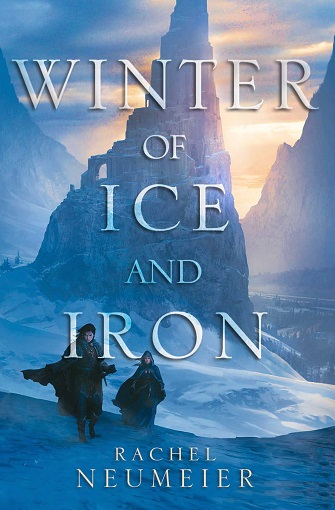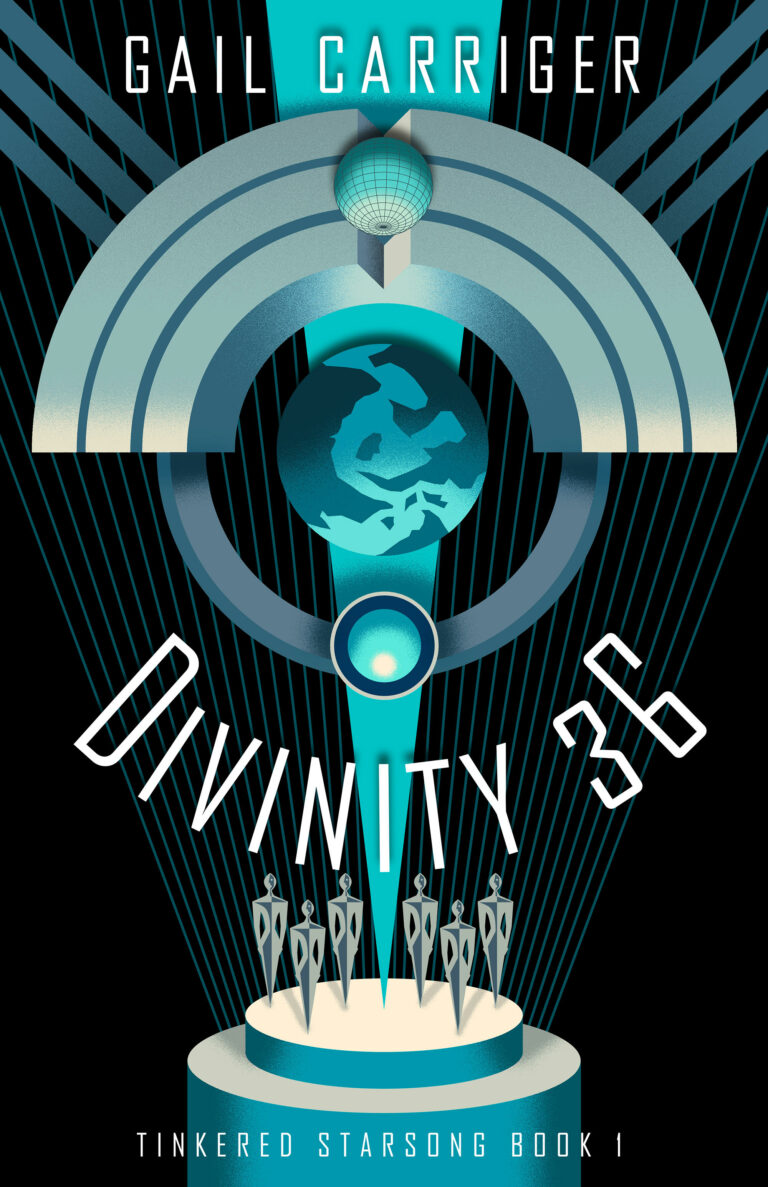
soupçon/ˈsuːpsɒn,ˈsuːpsɒ̃/ noun
1. a very small quantity of something; a slight trace, as of a particular taste or flavorSunday Soupçons is where I scribble mini-reviews for books I don’t have the brainspace/eloquence/smarts to write about in depth – or if I just don’t have anything interesting to say beyond I LIKED IT AND YOU SHOULD READ IT TOO!
Two very different books I enjoyed a lot!

Genres: Queer Protagonists, Sci Fi
Representation: Queer MC
ISBN: B0BZWZM5JG
Goodreads

The aliens are coming for us and they want our voices.
New York Times bestselling author Gail Carriger brings you a gloriously warm and unique scifi about the power of art, celebrity, and found family.
Phex is a barista on a forgotten moon. Which is fine – he likes being ignored and he’s good at making drinks. Until one day an alien hears him singing and recruits him to become a god. Now Phex is thrust headfirst into the galaxy’s most cutthroat entertainment industry, where music is visible, the price of fame can kill, and the only friends he has want to be worshiped.
Welcome to the divinity. Where there is no difference between celebrity and religion, love and belief, acolyte and alien. Where the right kind of obsession can drive a person crazy or turn them divine.
I pounced when I learned Carriger was going back to the same sci fi setting as Fifth Gender, which was a) one of the first books I ever reviewed for this blog and b) a TON of fun!
The Tinkered Starsong series (at least in this book) has no crossover whatsoever with Fifth Gender, but that’s fine, because we get new very lovable characters and fascinating worldbuilding (which is strange, but actually easier to understand, I think, than what we got in Fifth Gender). The music industry is now synonymous with religion – popstars are called gods, and their fans are worshippers. It’s an oddly easy premise to wrap your head around – let’s be fair, it’s not the biggest jump to imagine the music industry as a religion, is it? – but we don’t have to wrestle with it too much in this book, since Divinity 36 is the story of Phex, the main character, trying out to become a god. It’s nothing like X Factor or any of those shows – the industry/faith is controlled by an alien race called the Dyesi, who have an almost mathematical formula for creating new bands, aka ‘pantheons’; while they do consider how the public at large responds to new pantheons late in the training stage, who makes it into which pantheon and which pantheons ‘ascend’ to become demigods is absolutely not down to public voting.
One of the more interesting aspects of the music in this universe/set-up is that it’s visible; godsong is performed on or under special constructions called Domes, and different sounds create different colours and patterns on the domes – and on the Dyesi members of the pantheon, since the Dyesi’s skin also responds to sound with colours and patterns (presumably the inspiration for their coming up with the Dome technology in the first place). The pantheons that make it are the ones whose music creates beautiful (mostly according to Dyesi aesthetics) colours and patterns. So it’s not enough to be a good singer, even an amazing singer; you have to be able to manipulate the Dome tech pleasingly, in coordination with the other singing members of your pantheon (some pantheon members do not sing, and instead are a bit like what we’d think of as back-up dancers, except there’s nothing ‘back-up’ about them).
Is this groundbreaking, wildly addictive sci fi? No. It’s very soft – a huge amount of focus is on the other people, of various species, trying out for godhood alongside Phex, and the slow forming of potential pantheons as relationships and compatible skillsets come together. There’s something about the whole thing that feels very passive – maybe because Phex really isn’t in control of any part of the process he’s undergoing? – but that didn’t strike as a bad thing; instead, it all feels very gentle and easy, pretty perfect for when your brain is just not up to handling anything that requires a lot of work. Divinity 36 is a book you can just drift along with, and that’s pretty blissful in the right circumstances.
There’s what’s clearly the beginnings/groundwork being laid for a romance in later books that had me rolling my eyes – while I REALLY enjoyed the secondary characters around Phex, the ones who are part of his tentatively-forming pantheon, I couldn’t STAND the love interest. Thankfully, we don’t have to deal with him much, and maybe he’ll improve in the next books.
Phex himself is…an interesting character, but not in the usual sense: he’s interesting because he’s not interesting. Especially at first, Phex almost seems to have little to no personality, or drive, or passions; he very much just rolls with whatever’s going on, accepting what the universe throws at him without comment. And to be fair, this makes perfect sense to me, because his past involves the kind of childhood trauma (never gone into graphically) that could definitely result in an adult who’s just content to go along with anything that isn’t actively awful. I can see some readers finding this annoying, but over the course of the book Phex does reveal – or maybe develop? – more of a personality (I suggest ‘develop’ because it really does seem possible that he only starts to figure out who he is as a person once he’s surrounded by people he cares about, which is a situation he’s never been in before). I really liked watching Phex discover his desire to take care of others, and how that in turn develops into outright protectiveness. The person he is at the end of the book is…someone I was weirdly proud I got to see come into being.
If that makes any sense at all.
Highly recommended for anyone looking for a sci fi interesting enough to keep you invested, but that you don’t have to work at.

Genres: Fantasy, Epic Fantasy, Queer Protagonists
Representation: Bisexual MC
ISBN: B06ZZBDGS7
Goodreads

In this gorgeous, dark fantasy in the spirit of Jacqueline Carey, a princess and a duke must protect the people of their nations when a terrible threat leaves everyone in danger.
With the Mad King of Emmer in the north and the vicious King of Pohorir in the east, Kehara Raehema knows her country is in a vulnerable position. She never expected to give up everything she loves to save her people, but when the Mad King’s fury leaves her land in danger, she has no choice but to try any stratagem that might buy time for her people to prepare for war—no matter the personal cost.'
Hundreds of miles away, the pitiless Wolf Duke of Pohorir, Innisth Eanete, dreams of breaking his people and his province free of the king he despises. But he has no way to make that happen—until chance unexpectedly leaves Kehara on his doorstep and at his mercy.
Yet in a land where immanent spirits inhabit the earth, political disaster is not the greatest peril one can face. Now, as the year rushes toward the dangerous midwinter, Kehera and Innisth find themselves unwilling allies, and their joined strength is all that stands between the peoples of the Four Kingdoms and utter catastrophe.
I DNFed this book earlier in the year, but I came back to it – as I said in the DNF review, I have to be exactly the right headspace for Neumeier’s writing, but gods, when I’m in the mood for it, absolutely nothing else will do!
I still don’t have a clue why the blurb comps this to Jacqueline Carey, because Winter of Ice and Iron in no way resembles or echoes any of her works – but it doesn’t need to, because it’s damn excellent in its own right. In this world, unhuman spirits referred to as Powers develop in any land dwelled on by humans, which then bond with the ruling bloodline of that land. (It’s not at all clear whether Powers bond to those already ruling the area, or whether it’s being chosen by the Powers that turns a bloodline into a ruling family.) Every kingdom has its Great Power, bound to that country’s monarchy, and then all the Powers of that kingdom’s duchies etc are subservient to that Great Power, as the dukes and such serve the King or Queen.
It’s a really fascinating concept that Neumeier does a lot with – I will be forever impressed with how much worldbuilding, and how much really unique worldbuilding, she packs into her standalones! – but I think what I appreciated most about this book – besides Neumeier’s strangely serene prose, which I get intense and insatiable cravings for in certain moods! – is how unconventional the whole shape of Winter of Ice and Iron is. This isn’t unique to Winter – most, maybe even all, of Neumeier’s stories go in unexpected directions, and subvert the story-beats we tend to expect – but I thought it was especially well done here. Neumeier isn’t afraid to put her characters into difficult situations without neat, easy solutions; to have their plans fail or twist in ways they Did Not Want; to go ahead and let/make the Bad Things happen, when you’re so sure that she can’t possibly ACTUALLY be ruthless enough to write that!
And then she does, and then you FLAIL, and also snarl at anyone who interrupts your reading time because suddenly, abruptly, the book shifts from ‘weirdly serene, despite Plenty Of Plot’, to ‘if-you-make-me-put-this-down-I-swear-to-the-GODS-you’ll-regret-it’!
The romance was especially interesting, to be honest: I liked that it started out as a political necessity that turned into genuine appreciation for each other, but I liked even more that Innisth has his male servant/lover who he does not give up when he gets married. I liked the unconventionality of that arrangement.
Although the whole thing of Innisth being queer is, I think, Not Great, since a) his sex with men is tied to the sadism required of him by the Power he’s bound to, which is immediately wtf, b) his lover is also his servant, which = dodgy power dynamics that I don’t love, and c) Innisth is kind of a semi-villain, and the only other queer character Neumeier has written so far was an outright villain, and so I’m not inclined to give her the benefit of the doubt here. I knocked off half a star for how the whole thing was handled.
But that doesn’t change the fact that I enjoyed Winter a hell of a lot, that I thought the worldbuilding and cast and need-to-save-the-world were all wonderful. It’s a genuinely excellent book, albeit one that takes a little while to really get going, and that requires you to be in the mood for a particular kind of…meditative?…prose.
What have you been reading?







Leave a Reply